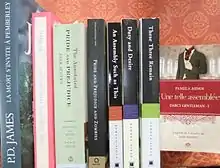Parallel novel
A parallel novel is an in-universe (but often non-canonical) pastiche (or sometimes sequel) piece of literature written within, derived from, or taking place during the framework of another work of fiction by the same or another author with respect to continuity.[1] Parallel novels or "reimagined classics" are works of fiction that "borrow a character and fill in his story, mirror an 'old' plot, or blend the characters of one book with those of another".[2] These stories further the works of already well-known novels by focusing on a minor character and making them the major character. The revised stories may have the same setting and time frame and even the same characters.[2]

Goodreads.com maintains a list of its readers' ratings of the most popular parallel novels. As of 2019 the top five were: Wide Sargasso Sea, Wicked, Telemachus and Homer, Rosencrantz and Guildenstern Are Dead (a play, not a novel), and The Penelopiad.[3]
Creating parallel novels can have significant legal implications when the copyright of the original author's work has not expired, and a later author makes a parallel novel derived from the original author's work.[4]
Examples
- March (2005) by Geraldine Brooks parallels Little Women (1868)
- Grendel (1971) by John Gardner parallels Beowulf
- Ahab's wife: Or, The Star Gazer (1999) by Sena Jeter Naslund parallels Moby-Dick (1851)
- The Mists of Avalon (1983) parallels Arthurian literature
- Jeeves: A Gentleman's Personal Gentleman (1981), a fictional expanded universe biography of Jeeves by Northcote Parkinson, attempts to provide background information about him.[5]
See also
- Crossover (fiction) - Sometimes canonical mixing of characters or worlds from originally separate fictional universes.
- Intercompany crossover comics.
- Expanded universe – Non-linear additions with consistency to the fictional universe
- Fan fiction – Type of fiction created by fans of the original subject
- Frame story – Story in a nested narration that brackets one or more embedded stories
- Mashup novel - Non-canonical mixing of texts in new genres without continuity often in parody.
- Metafiction – Genre of fiction about fiction
- Revisionism (fictional) – Works of fiction revised and retold
- Spin-off (media) – Narrative work derived from one or more already existing works that focuses in more detail on one aspect of that original work
References
- Patrick, Bethanne (November 25, 2007). "'Neither prequel, nor sequel, it's parallel novel'". Washington Post. Archived from the original on 29 November 2013. Retrieved 29 November 2013.
- Cellier-Smart, Catherine. "Parallel Novels". West Milford Township Library. Archived from the original on 2 December 2013. Retrieved 29 July 2016.CS1 maint: bot: original URL status unknown (link)
- "The Best Parallel Novels or Reimagined Classics". Goodreads. Amazon. 1 October 2013. Retrieved 2019-09-17.
- Locke, Scott D. (2018). "Parallel Novels and the Reimagining of Literary Notables by Follow-On Authors: Copyrights Issues When Characters Are First Created by Others". Chicago-Kent Journal of Intellectual Property. 17 (2): 271. Retrieved 2019-09-17.
- Parkinson, C. Northcote (1981) [1979]. Jeeves: A Gentleman's Personal Gentleman (U.S. ed.). New York: St. Martin's Press. ISBN 0-312-44144-4.
